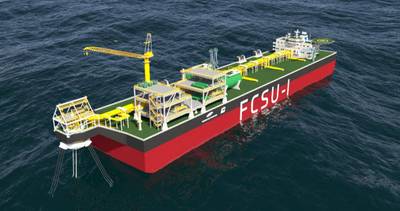Samsung Heavy and MISC Develop Floating CO2 Storage Unit
Samsung Heavy Industries has received basic certification for a floating CO2 storage unit (FCSU) from DNV.
The FCSU, jointly developed by Samsung Heavy Industries and MISC, is 330 meters long and 64 meters wide, and has a high-pressure tank capacity that can store 100,000 cubic meters of liquefied CO2 at -50 degrees Celsius or less.
The injection module mounted on the upper part of the hull secures the ability to send five million tons (MTPA) of CO2 per year to the depths of the seabed. This is equivalent to the amount of CO2 emitted by approximately 3.3 million passenger cars for a year.
The FCSU can be deployed across multiple depleted oil and gas fields offshore that have been earmarked as potential CO2 storage sites.
The FCSU serves a dual role by functioning either as an intermediate CO2 storage unit or, in tandem, as an injection vehicle (known as FCSU-i) for offshore CO2 reservoirs. Efforts are currently ongoing to explore a wider range of potential applications and for example, to include CO2 liquefaction facility, amplifying its utility and practicality.
Samsung Heavy Industries and MISC have been conducting carbon capture and storage (CCS) product technology research and feasibility analysis since January of this year.
MISC plans to develop a business model to store CO2 in depleted subsea oil and gas wells around the world, including Malaysia, and to build a cooperative system in the form of supplying FCSU to Samsung Heavy Industries.
Yoon Kyun-jung, head of Samsung Heavy Industries' offshore EM team (managing director), said, "Samsung Heavy Industries' offshore plant business is expanding from existing oil and gas facilities such as FPSO and FLNG to eco-friendly products ranging from offshore wind power, nuclear power, and CCS. We will secure future growth engines with eco-friendly technologies.”













